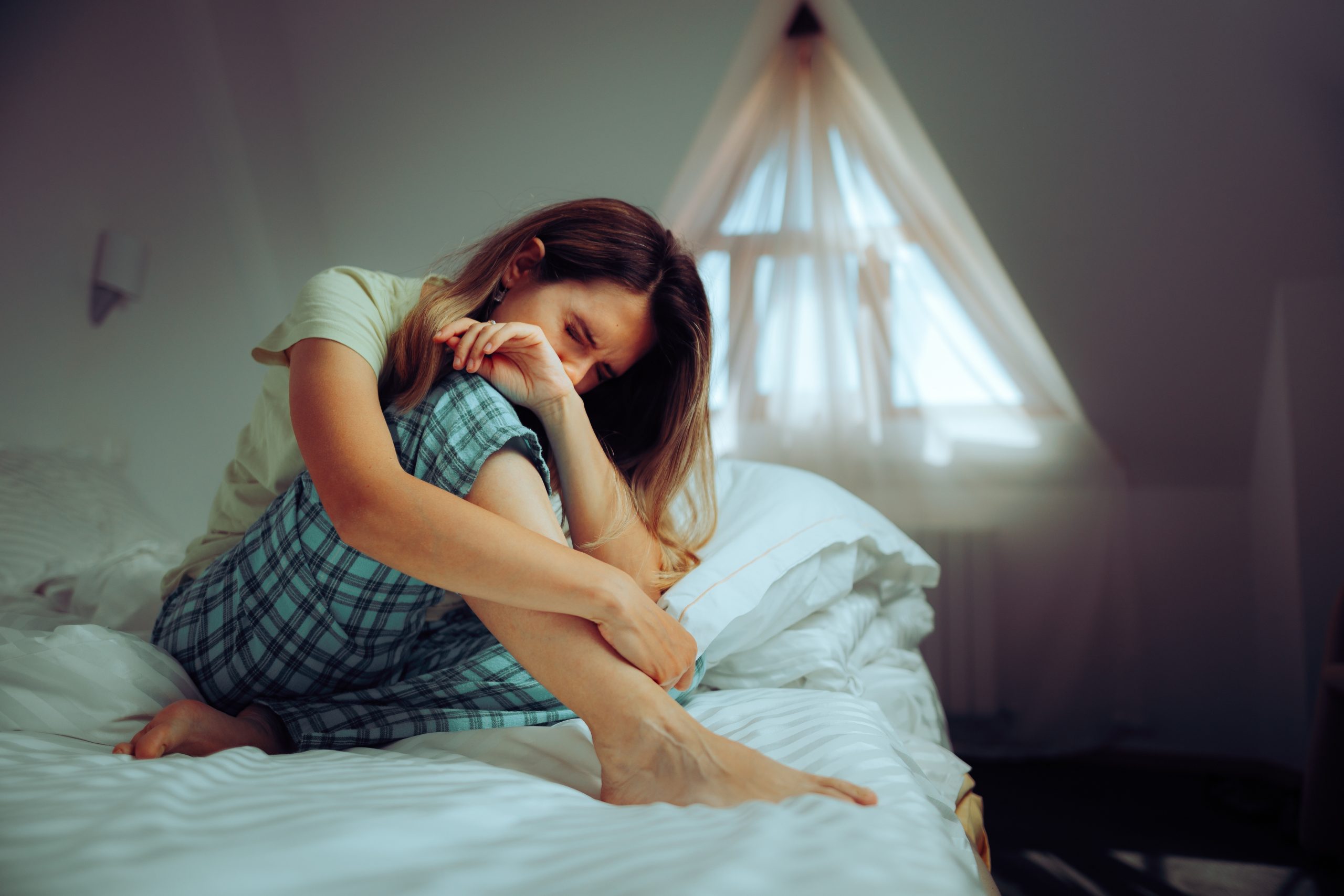Waking up with a sudden, stabbing pain in your calf can be frustrating. If you’ve experienced them, you know how they can ruin a good night’s sleep.
Calf cramps at night, also called nocturnal leg cramps or charley horses, are involuntary muscle spasms. They often target the calves or feet and can last for several minutes.
While they usually aren’t dangerous, they can disrupt your rest and affect your energy the next day.
According to the Sleep Foundation, about 60% of adults report having nighttime leg cramps at some point. They’re especially common in older adults and women, but anyone can experience them.
This article explains what calf cramps at night are and how they differ from restless legs syndrome. It also covers common causes, simple ways to prevent them, and what you can do to relieve night leg cramps.
Calf Cramps at Night vs. Restless Legs Syndrome
Nocturnal leg cramps are painful, involuntary muscle contractions that mostly affect the calf muscles or feet. They strike suddenly and can disrupt sleep with severe pain that lingers even after the cramp ends.
Restless legs syndrome feels different. Instead of a cramped muscle, you experience an urge to move your legs. The discomfort builds as you’re falling asleep and eases once you stretch or shift position.
The overlap in timing often confuses patients. Both show up at night, but the symptoms point to different health issues.
Keeping notes on when cramps happen, how long they last, and what relieves them helps your doctor review possible treatment options.
Suggested Reading:
What’s Causing Your Aching Legs at Night?
Common Causes of Nocturnal Leg Cramps
Nocturnal muscle cramps can come from many factors. Some are linked to lifestyle, while others connect to health conditions.
- Dehydration and low minerals: Lack of fluids or electrolytes makes leg muscles more likely to spasm. Magnesium supplements may help in some cases.
- Pregnancy: Pregnant women often develop cramps in the third trimester due to extra weight and changes in blood flow.
- Medications: Certain drugs, including those for high blood pressure, can affect muscle function and trigger cramps at night.
- Chronic conditions: Kidney failure, peripheral neuropathy, and diabetic nerve damage may cause cramps that return frequently.
- Circulation problems: Peripheral artery disease and some neurological disorders can restrict blood flow and cause painful cramps.
- Physical activity: Overuse of calf muscles during exercise or long periods of sitting can both increase the risk of cramping.
- Footwear and posture: Lack of supportive shoes during the day or a sleeping position with feet flat or pointed down can strain muscles.
Some cramps overlap with issues like painful thigh muscle, where circulation and nerve strain contribute to discomfort.
How to Prevent Night Leg Cramps
Sleep-related leg cramps can be unpredictable, but certain daily habits reduce how often they occur. These steps target the triggers that leave calf muscles prone to spasms at night.
Stretch Before Bed
Regular stretching improves flexibility in calf muscles and hamstrings. Hold each stretch for 20 to 30 seconds, and repeat a few times.
Focus on slow, steady movements that relax the affected muscle without forcing it. Consistent stretching can prevent leg cramps from disturbing your sleep.
Stay Hydrated
Fluids support healthy muscle function. Without enough water, skeletal muscle cramps are more likely to strike at night. Carry water with you during the day, and try to limit caffeine and alcohol, which deplete fluids.
For some patients, hydration paired with magnesium-rich foods helps reduce painful episodes.
Keep Muscles Active
Light physical activity supports blood flow and reduces tightness. A short walk after dinner or gentle cycling helps keep leg muscles from stiffening before bed.
If your job involves sitting for long periods, take breaks to stand and stretch to prevent leg cramps later.
Footwear and Sleeping Position
Supportive shoes protect leg muscles during the day, reducing strain that carries into the night.
At bedtime, check your sleeping position. Lying with one foot pointed down can increase tension and trigger nocturnal muscle cramps.
Looser bedding helps your feet rest in a more natural position.
Relief Tips for Nighttime Calf Cramps
When a cramp wakes you, following these tips can help relieve the pain and relax the affected muscle:
- Stretch the calf gently: Pull your toes upward toward your shin. This movement lengthens the calf and helps the cramp release.
- Massage the cramped area: Apply firm pressure with your hands to reduce tightness and encourage blood flow.
- Stand and walk: Getting upright shifts weight into your leg muscles. Keep your feet flat on the floor while you move.
- Apply heat or cold: Use a warm compress to relax tension or a cold pack if the discomfort feels sharper.
- Practice steady breathing: Slow breaths calm your body, which may shorten how long the cramp lasts.
Most episodes fade within minutes, but some leave behind soreness. If you notice cramps causing significant pain, or if they’re tied to sleep disorders or neurological conditions, talk with your doctor.
When to Seek Medical Care for Nocturnal Leg Cramps
Most nighttime cramps resolve on their own, but there are times when medical care is necessary. A doctor can rule out whether an underlying condition is contributing to the problem.
You should make an appointment if:
- Cramps wake you often and disrupt your sleep cycle.
- They become more severe over time or occur nightly.
- You notice swelling, skin changes, or weakness in the legs.
- Other symptoms, like numbness or tingling, appear alongside cramps.
If a cramp sends you to the emergency room, it’s usually a sign of a more serious health condition that needs immediate attention.
Relieve Night Cramps With Wellness and Pain
Do calf cramps keep interrupting your sleep? Home remedies may help, but frequent cramps often call for more targeted care.
At Wellness and Pain, treatment focuses on both relief and prevention. Chiropractic care eases nerve pressure that may trigger involuntary contractions.
Medical massage therapy improves blood flow and loosens stiff calf muscles. Acupuncture supports circulation and reduces tension, while injections calm spasms connected to joint inflammation.
You’ll also get practical guidance on daily habits like hydration and stretching. These changes support healthier muscles and help reduce nighttime cramps.
Better nights mean better mornings. If calf cramps keep disturbing your rest, it’s time to explore treatment that addresses the root cause.
Say goodbye to midnight cramps. Request an appointment with Wellness and Pain and start enjoying restful nights again.
FAQs About Calf Cramps at Night
Is it normal to get calf cramps every night?
Occasional cramps are common, but nightly cramps aren’t considered normal. Frequent cramps can point to an underlying condition, side effects from medication, or circulation problems. If cramps keep disrupting your sleep, it’s a good idea to speak with a doctor.
What is the fastest way to relieve a cramp at night?
Stretching is usually the quickest relief. Pull your toes upward toward your shin to stretch the calf. Standing up and placing your feet flat on the floor can also help.
Some people find that massaging the cramped muscle or applying a warm compress works quickly as well.
Can dehydration cause calf cramps at night?
Yes, dehydration can make muscles more prone to cramping. When your body lacks fluids, electrolyte levels may also drop, which affects muscle function.
Staying hydrated throughout the day and limiting alcohol or caffeine can reduce the chance of night cramps.











